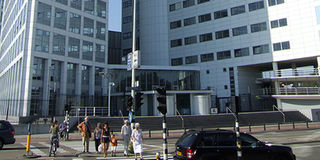Why ICC could hold Ocampo Six hearings in Kenya

The International Criminal Court building at The Hague. Photo/FILE
The International Criminal Court has moved to explain why it had sought to hear the confirmation of charges against six individuals summoned over the 2007 post-election violence in Kenya.
The judges have asked the ICC prosecutor, the defence and the victims for their ideas on “the desirability and feasibility of conducting the confirmation of charges hearings” in the country.
The confirmation of charges hearings will be held on September 1 for Eldoret North MP William Ruto, radio presenter Joshua Sang and Tinderet MP Henry Kosgey, and on September 21 for Deputy Prime Minister Uhuru Kenyatta, public service boss Francis Muthaura and former police commissioner Hussein Ali.
A confirmation of charges hearing is held to determine if there is sufficient evidence to believe a suspect committed the crimes he is charged with.
If the charges are confirmed, the Pre-Trial Chamber commits the person to a Trial Chamber, which conducts the next phase of the proceedings – the trial.
A press statement from the Pre-Trial Chamber II said the parties had until Monday to submit their suggestions.
On Saturday, ICC Associate Legal Outreach Officer Jelena-Larmour Vukasinovic sought to address the questions raised by the ICC move.
Why are the (Pre-Trial Chamber II) judges considering having the hearings in Kenya?
In situ hearings are provided for in the court’s statutory provisions. Indeed, the drafters provided for the possibility of the court to sit outside The Hague where it is in the interest of justice.
In particular, in situ hearings have an impact as the court would sit closer to the affected communities and the general public in Kenya.
Does it mean that the ICC judges and the staff would actually move to Kenya to conduct the hearings?
Yes. The judges composing Pre-Trial Chamber II and a limited number of staff would move to Kenya solely for the time of the confirmation of charges hearings.
The judges requested observations from the parties and participants; why not the government?
According to the Rules of Procedure and Evidence, while the Chamber takes the initiative to trigger the question of whether in situ proceedings may take place, it is the ICC presidency which is in charge of consulting the state where the court intends to sit.
If that state agrees that the court can sit in its territory, the decision to sit in the territory of that state is finally to be taken by a two-thirds majority of the 18 judges of the ICC in a plenary session.
If the court decides to sit in Kenya, wouldn’t that put at risk the people who may be called to appear as witnesses?
Unlike in a trial, there may be no witnesses called to testify at a confirmation of charges hearing.
In the event that witnesses are called to testify, protective measures may be taken, such as video-link, voice and face distortion, use of pseudonyms and conducting hearings in closed sessions.
Finally, how long will it take for Appeals Judges to decide on the admissibility issue?
No time limit is provided for in the legal texts applicable before the ICC. It will depend on the complexity of the questions raised.




